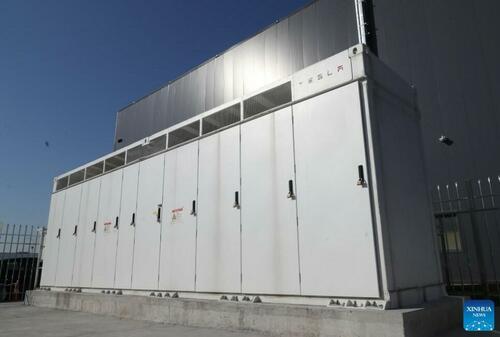Energy & Critical Metals
Russia’s Rosatom to Invest $600 Million in Bolivian Lithium Mining
By Eugene Gerden The Russian nuclear monopoly Rosatom has agreed to build an industrial complex…

By Eugene Gerden
The Russian nuclear monopoly Rosatom has agreed to build an industrial complex in Bolivia for the extraction and production of lithium carbonate worth US$600 million.
The project will be implemented by the company’s mining subsidiary Uranium One Group in cooperation with the Bolivian state-owned company Yacimientos de Litio Bolivianos (Lithium Fields of Bolivia).
In June 2022, Yacimientos de Litio Bolivianos announced that Uranium One Group was one of the main bidders in the tender to develop several major lithium deposits in the country along with the American Lilac Solutions, as well as four companies from China. At that time President of Yacimientos de Litio Bolivianos (Lithium Fields of Bolivia), Carlos Ramos, said that these applicants provided the best technologies for development of the field and the conduction of mining activities on it.
Under the terms of the project, Uranium One Group will develop the Pastos Grandes field, which is located in the Potosi department in southwestern Bolivia. For Rosatom, this is the first large-scale foreign project for lithium production, investments in which will amount to about $600 million, said Kirill Komarov, Director of the Development and International Business Unit of Rosatom.
According to Komarov, the project involves building of an industrial complex with a capacity of 25,000 tonnes (6% of world production) of lithium carbonate per year with the possibility of increasing these figures based on the results of geological exploration. The commissioning of the first stage of the complex and the beginning of production of finished products is scheduled for 2024, while reaching full capacity (25,000 tonnes) in 2027.
At present, the list of the world’s largest lithium producers includes Australia (55%), Chile (26%), China (14%) and Argentina (6%). In the case of Bolivia, until now there has been almost no serious lithium mining activities in the country, although, according to data of the US Geological Survey, the country’s reserves are estimated at 21 million tons, which is equivalent to 21.4% of world’s resources of the metal. Russia also does not yet produce lithium, importing about 9,000 tonnes of lithium carbonate per year from South America.
In April 2023, Bolivian President Luis Arce stated that Bolivia “has entered the era of lithium and needs to accelerate”. For this reason, foreign partners were attracted, including Uranium One Group.
Thanks to new mining technologies, Bolivia will be able to start exporting lithium batteries in 2026, and by 2030 it should provide up to 40% of the world’s lithium supply, making it the “lithium capital of the world,” the President said earlier.
In the meantime, Rosatom, which is already building a Nuclear Research and Technology Center in Bolivia, the company plans to participate in creating a full value chain for the commercial use of lithium, from mining to manufacturing batteries. In addition, according to some Russian media, Rosatom is interested in diversifying the sources of metal supplies for its Russian projects. The state corporation is building a gigafactory for the production of batteries for electric vehicles on the territory of the Baltic NPP in the Russian Kaliningrad region, the launch of which is scheduled for autumn 2025.
This is not the only lithium mining project which is implemented by Rosatom. Currently, the company together with Norilsk Nickel, plans to start lithium mining at Russia’s largest Kolmozerskoye deposit in the Murmansk region with reserves of 75 million tonnes (about 19% of all reserves in Russia). The joint venture of the companies, known as Polar Lithium, received a license for the development of the deposit in February 2023.
However, completion of design and exploration work on this project is planned only in a few years, while reaching the design capacity of 45,000 tonnes per year by 2030. For Rosatom, it is important to have domestic lithium mining projects despite the economic attractiveness of projects in Bolivia, as there are significant risks in transportation of raw materials through the seaports in Chile and Argentina.

Uranium Exploration Company Announces Additional Staking in the Athabasca Basin
Source: Streetwise Reports 12/22/2023
Skyharbour Resources Ltd. announced an update from its Canada-based Falcon Project along with additional…
Tesla Launches New Mega Factory Project In Shanghai, Designed To Manufacture 10,000 Megapacks Per Year
Tesla Launches New Mega Factory Project In Shanghai, Designed To Manufacture 10,000 Megapacks Per Year
Tesla has launched a new mega factory…
Giving thanks and taking stock after “a remarkable year”
An end-of-year thank you to our readers, industry colleagues and advertisers before Electric Autonomy breaks from publishing until Jan. 2
The post Giving…










